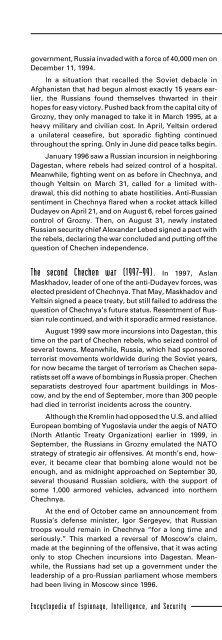ENCYCLOPEDIA OF Espionage, Intelligence, and Security Volume ...
ENCYCLOPEDIA OF Espionage, Intelligence, and Security Volume ...
ENCYCLOPEDIA OF Espionage, Intelligence, and Security Volume ...
You also want an ePaper? Increase the reach of your titles
YUMPU automatically turns print PDFs into web optimized ePapers that Google loves.
Chechen-Russian Conflictgovernment, Russia invaded with a force of 40,000 men onDecember 11, 1994.In a situation that recalled the Soviet debacle inAfghanistan that had begun almost exactly 15 years earlier,the Russians found themselves thwarted in theirhopes for easy victory. Pushed back from the capital city ofGrozny, they only managed to take it in March 1995, at aheavy military <strong>and</strong> civilian cost. In April, Yeltsin ordereda unilateral ceasefire, but sporadic fighting continuedthroughout the spring. Only in June did peace talks begin.January 1996 saw a Russian incursion in neighboringDagestan, where rebels had seized control of a hospital.Meanwhile, fighting went on as before in Chechnya, <strong>and</strong>though Yeltsin on March 31, called for a limited withdrawal,this did nothing to abate hostilities. Anti-Russiansentiment in Chechnya flared when a rocket attack killedDudayev on April 21, <strong>and</strong> on August 6, rebel forces gainedcontrol of Grozny. Then, on August 31, newly instatedRussian security chief Alex<strong>and</strong>er Lebed signed a pact withthe rebels, declaring the war concluded <strong>and</strong> putting off thequestion of Chechen independence.The second Chechen war (1997–99). In 1997, AslanMaskhadov, leader of one of the anti-Dudayev forces, waselected president of Chechnya. That May, Maskhadov <strong>and</strong>Yeltsin signed a peace treaty, but still failed to address thequestion of Chechnya’s future status. Resentment of Russianrule continued, <strong>and</strong> with it sporadic armed resistance.August 1999 saw more incursions into Dagestan, thistime on the part of Chechen rebels, who seized control ofseveral towns. Meanwhile, Russia, which had sponsoredterrorist movements worldwide during the Soviet years,for now became the target of terrorism as Chechen separatistsset off a wave of bombings in Russia proper. Chechenseparatists destroyed four apartment buildings in Moscow,<strong>and</strong> by the end of September, more than 300 peoplehad died in terrorist incidents across the country.Although the Kremlin had opposed the U.S. <strong>and</strong> alliedEuropean bombing of Yugoslavia under the aegis of NATO(North Atlantic Treaty Organization) earlier in 1999, inSeptember, the Russians in Grozny emulated the NATOstrategy of strategic air offensives. At month’s end, however,it became clear that bombing alone would not beenough, <strong>and</strong> as midnight approached on September 30,several thous<strong>and</strong> Russian soldiers, with the support ofsome 1,000 armored vehicles, advanced into northernChechnya.At the end of October came an announcement fromRussia’s defense minister, Igor Sergeyev, that Russiantroops would remain in Chechnya “for a long time <strong>and</strong>seriously.” This marked a reversal of Moscow’s claim,made at the beginning of the offensive, that it was actingonly to stop Chechen incursions into Dagestan. Meanwhile,the Russians had set up a government under theleadership of a pro-Russian parliament whose membershad been living in Moscow since 1996.Encyclopedia of <strong>Espionage</strong>, <strong>Intelligence</strong>, <strong>and</strong> <strong>Security</strong>Chechnya since 1999. By the end of the 1990s, it wasestimated that some 100,000 people had died, <strong>and</strong> morethan 400,000 were rendered homeless, by the wars inChechnya. In 2002, actions by Chechen troops <strong>and</strong> terroristsagainst the Russians continued, with suicide bombings,the downing of a Russian helicopter, <strong>and</strong>—mostdramatically—the storming of a Moscow concert hall inlate October. The Russian government responded to theterrorists by gassing the building, rescuing most of thehostages, while killing some hostages along with theperpetrators.On November 3, 2002, Sergei Ivanov, who had replacedSergeyev as defense minister, announced thatRussia would intensify military operations in Chechnya.Military activity continued, but in early 2003, Russia signaleda new strategy. It declared six months’ amnesty forall who had fought on either side in the Chechen conflictsince 1993, offering all combatants—including convicts<strong>and</strong> those under investigation, though not persons accusedof major crimes such as murder—immunity fromprosecution or prison time.The Russian <strong>and</strong> Chechen governments held a referendumin April, 2003, that saw large voter acceptance for anew Russian-backed constitution. Critics in Chechnya, however,charged that the referendum <strong>and</strong> constitution weresimply a means toward providing an illusion of self-rule.Internationally, leaders of human rights groups, as well assome Western officials, described the election as an attemptby the Kremlin to avoid negotiation with guerrillaforces.❚ FURTHER READING:BOOKS:Gall, Carlotta, <strong>and</strong> Thomas De Waal. Chechnya: Calamityin the Caucasus. New York: New York University Press,1998.Knezys, Stasys, <strong>and</strong> Romanas Sedlickas. The War inChechnya. College Station: Texas A&M University Press,1999.Lieven, Anatol. Chechnya: Tombstone of Russian Power.New Haven, CT: Yale University Press, 1998.Politkovskaia, Anna. A Dirty War: A Russian Reporter inChechnya. London: Harvill, 2001.ELECTRONIC:Chechnya News. (April30, 2003).Pravda. (April 30, 2003).Russian Informational Centre. Ministry for Press, Television,Radio Broadcasting <strong>and</strong> Mass Communications ofthe Russian Federation. (April 30, 2003).SEE ALSOCold War (1972–1989): The Collapse of the Soviet Union173







![The Big Lie 9-11 and Government Complicity in Mass Murder [PDF]](https://img.yumpu.com/50957077/1/190x245/the-big-lie-9-11-and-government-complicity-in-mass-murder-pdf.jpg?quality=85)








